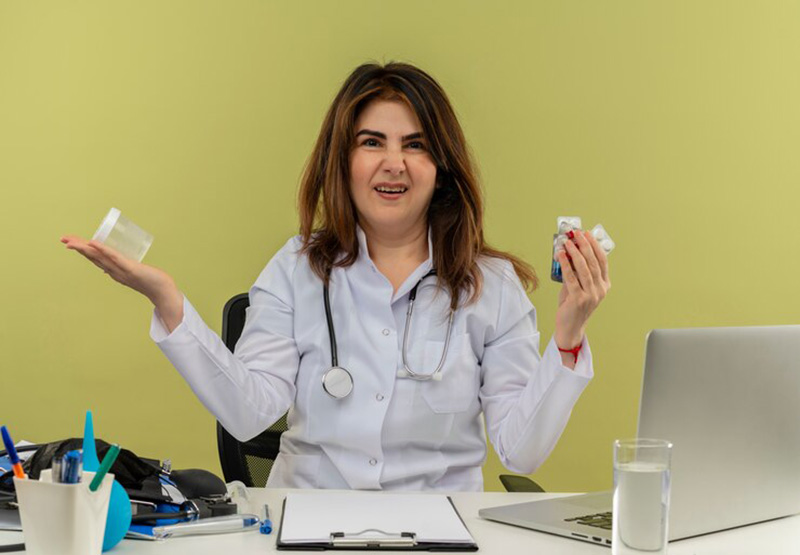The human gut is home to billions of beneficial bacteria that play pivotal roles in digestion, nutrient absorption, and immune system support. This thriving world of good bacteria is collectively known as the gut microbiome. At the heart of this intrigue lies a fundamental question: How long does it take for probiotics to work?
However, various factors such as a diet rich in processed foods, certain medications, and stress can disrupt this delicate ecosystem, leading to issues like digestive discomfort, irregular bowel movements, increased susceptibility to illness, and allergies. In today’s article, I’ll explore how long probiotics take to work and the signs of it’s working.

What Are Probiotics?
In recent years, probiotics have gained immense popularity as a dietary supplement. These supplements consist of strains of beneficial bacteria found in a healthy gut, aiming to rebalance and fortify the gut microbiome. Probiotics are known for their potential to improve digestion, enhance gut health, and contribute to overall well-being.
How Long Does Probiotics Take to Start Working?

The effectiveness of probiotics can vary depending on your specific health goals, your gut condition, and the quality of the probiotic supplement you’re taking. When consuming a high-quality multispecies and multi-strain probiotic, initial improvements in digestion may be noticeable within the first one to two weeks. Some individuals might even experience changes within a few days.
Signs That Probiotics Are Working

When you start incorporating a high-quality probiotic supplement into your daily routine, you may notice a range of positive changes in your body. These changes can include :
Positive Change in Digestion
Your gut bacteria significantly influence the speed and efficiency of food digestion. An imbalanced gut microbiome can lead to digestive discomfort, such as bloating, gas, and stomach aches after meals. High-quality probiotics can help improve digestive health and alleviate these symptoms.
Regular Bowel Movements
Imbalance gut bacteria can contribute to irregular bowel movements. Probiotics can help by introducing more beneficial bacteria to crowd out harmful ones, thereby preventing loose stools and diarrhea. They can also stimulate mucus production, regulating constipation.
Boost Energy
Nutrient absorption in your gut is crucial for energy production. Inflammation in the gut lining caused by an imbalanced microbiome can hinder this process, leading to nutrient deficiencies and reduced energy levels. Probiotics can help repair the gut, reduce inflammation, and boost energy.
Better Mood and Brain Health
The health of the brain and the gut communicate continuously, including through neurotransmitters. Some neurotransmitters in the brain, like serotonin, are also produced in the gut. An imbalanced gut microbiome and inflammation can reduce serotonin production, negatively affecting mood. Probiotics can restore balance, producing chemicals that can help alleviate anxiety and depression.
Better Immune System
Nutrient absorption in the gut is essential for a strong immune system. Certain nutrients, such as B vitamins, zinc, and vitamin C, support immune function. An imbalanced gut microbiome can hinder nutrient absorption and weaken the immune system. Probiotics restore a healthy gut barrier, preventing larger particles and toxins from entering the bloodstream and triggering constant immune responses. Some probiotics also promote immune regulation.
Reduce the Risk Of Anxiety and Stress
The gut-brain health is well-established. An imbalanced gut microbiome often accompanies increased anxiety, and conditions like Alzheimer’s and depression have been linked to gut dysbiosis. Gut inflammation can also affect mood and stress response. Some probiotics help to relieve stress and improve mood by enhancing the gut barrier and acting on the gut-brain axis.
Enhanced Cognitive Health
Cognitive health is closely linked to gut health. Gut inflammation resulting from microbial imbalance can impair cognitive function. Over time, this inflammation can lead to a permeable gut lining, allowing toxins to enter the bloodstream and reach the brain, triggering further inflammation. Probiotics can restore a healthy gut barrier, positively impacting cognitive function.
No More Sugar Cravings
Harmful bacteria and pathogens can manipulate your body into craving sugar, their primary food source. Increased sugar consumption can promote their growth. Probiotics with diverse strains can rebalance your gut flora, reducing opportunities for these pathogens to thrive. Some probiotic strains also combat sugar cravings.
When You Might Need to Be Patient
Navigating the realm of probiotics can be akin to a marathon rather than a sprint. While many individuals tout the immediate benefits they reap from these beneficial microorganisms, it’s vital to recognize that everyone’s journey with probiotics is distinct. There are instances where the wait might be a tad longer, and understanding the reasons can help maintain enthusiasm and persistence.
Cases where probiotics take longer
Imagine the gut as a bustling city with unique rhythms, balances, and occasional chaos. If this city has been through prolonged periods of imbalance, like extended bouts of poor diet, stress, or frequent antibiotic use, it might resemble a town recovering from a storm. Introducing probiotics can be like sending in a skilled restoration crew in such scenarios. But even the most adept teams need time to repair and rejuvenate extensively damaged areas.
The importance of consistency
In health and wellness, consistency often holds the key to lasting benefits. Consider probiotics as diligent gardeners tending to the garden of your gut. Regular care, watering, and attention are paramount for the garden to thrive. Similarly, to ensure that the levels of beneficial bacteria in the gut remain optimal, it’s crucial to maintain a regular and consistent intake of probiotics.
Conclusion
Probiotics are a promising avenue for enhanced health and well-being with their potential benefits. While the journey to experiencing their full effects can vary, understanding the signs, science, and factors at play can make the path clearer and more rewarding. As we unravel the complexities of our gut, one thing remains clear: these tiny microorganisms hold immense potential for our overall health.
Frequently Asked Questions (FAQs)
Are all probiotics the same?
Nope! Probiotics come in various strains, like fruits, apples, oranges, and bananas. Each one has its specialty, like aiding digestion or boosting your immunity.
I just started taking probiotics, and I feel gassy. Is that normal?
Yes, it can be. Moving to a new city takes adjustment; introducing probiotics to your gut can be a bit of a shake-up at first. Some initial gas or bloating might occur, but it usually settles down with time.
I had some tummy troubles after starting probiotics. What can I do?
Firstly, don’t worry! You can reduce your dose for a bit and then slowly increase it. Sometimes, it’s also about finding the right strain that suits your body. If unsure, always reach out to a healthcare professional.
